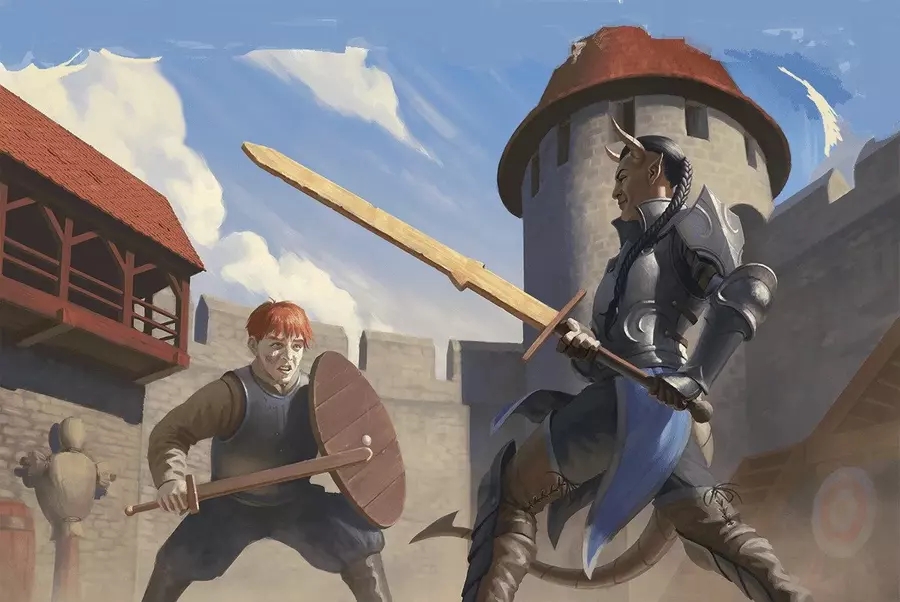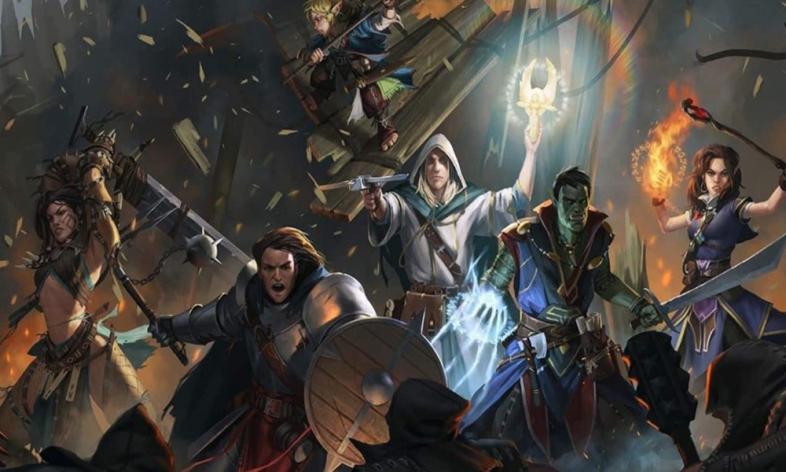In the game Traveller, characters are rolled up as cadets in the space corps. Each tour of duty in the corps makes the player a few years old and, usually richer and more skilled. Sometimes, tho, the character can be seriously injured or even killed.

This possibility–dying during character creation–has sometimes been ridiculed, but it’s not as crazy as it seems. For one thing, it’s a push-your-luck mechanism, meaning that each tour is a chance to improve your character before you even start going on adventures, but there has to be a point where the character leaves the corps and becomes an active adventurer. And the risk of losing a limb or even life is an obvious way to do it.
But secondarily, it makes character creation part of playing the game. You’re not just building a character; you’re playing out the early part of the character’s life and career. It’s fun in itself.
Is this something you can do in D&D and OSR systems? Sure. Note that these mechanics are untested and not even fully fleshed out. You would need to adapt them to whatever system you use, particularly because the different playable creature types in fantasy games have different lifespans, so you would at least need to multiply the times by some amount for non-humans to keep things balanced.
Childhood
Start with just enough geographical and cultural lore to allow players to decide where their characters are from based on their ancestry.
Seven* Years of Training
Characters start out with a base age of, say, 8+2d3 for humans. Such youths are often sent to live with friends as a servant, page, laborer, or apprentice. There, they get training in the field, trade, or craft their parents have chosen or they seem to have an aptitude for. Those of higher status are tutored at home until they are old enough to be fully educated in commerce, magic, mysticism, engineering, art, law, or other professional pursuits.
Characters typically spend 7 years in an apprenticeship to learn their class skills, altho for rogues this is often informal.
* Note, tho, that elves, being flighty and chaotic, must have apprenticeships and other training that are longer to be as effective as humans’, so multiply all timings by 3. And dwarves, being distracted by the study of stonework and such, likewise must study longer (2x timings). Halflings share some traits with elves (1.5x).
- Warrior types are trained in armor and weapons by a master of arms. An aspiring paladin might be a page who becomes a squire of a knight/paladin. A future ranger might start with archer and/or gamekeeper training.
- Wizards are trained as apprentices by a master in the arcane arts or attend a school of magic as students.
- Clerics are educated as clerks or novices by elder mystics in an abbey. Aspiring druids are educated by other druids in a rural setting.
- Thieves and bards learn their skills under an experienced rogue or gang of youths. But they may first work as a servant or apprentice at a proper trade (carpentry, shoemaking, musicianship, etc.) but run away from it.
Encourage the players to name and describe their master, who will remain their mentor for a time as they adventure. They should also outline their family and why the character chose (or was pushed into) one class over another.
A Few Years as a Journeyman
Then the youths become journeymen. They go out into the world, travel a bit, and work under other masters (perhaps finding a new mentor). This lasts 2d3 more years for warriors and rogues, 3d3 for wizards and clerics. During this time, they save 75% of their starting gold and get all their skill slots (or whatever, depending on your system).
This is the time to give some more geographical and cultural lore to the players so they can decide where they finished their training and how, especially if they did some traveling.
Early Career
Then the young folk are ready to make their way in the world. They can either become adventurers now–with less than their full starting gold–or take up a mundane occupation. They may become guards, mercenaries, assistants to a master wizard, a bodyguard (fighter or mage) to a small-time merchant. Clerics become minor functionaries in their church or temple. Rogues may become sailors, burglars, traveling entertainers, highwaymen, henchmen of master rogues, etc.
This lasts 2d3 more years, during which they gain the last 25% of their starting gold and have a 1 in 20 chance of a life-altering setback (explained below). On a roll of natural 20, the character also gains another skill slot (not an extra spell). During this time, some of the player characters should meet one another and become friends.
It’s important that longer work before adventuring does more than make the character older and richer. If your game system doesn’t have skills, consider saying that this work gives them a background trait that, when they attempt something relevant to it, gives them an advantage on the attempt. If a rogue spent time as a sailor, for example, it’s logical that an attempt to tie a knot, sneak aboard a ship, impersonate a ship’s officer, etc. would be easier.
Players will need a bit more cultural lore to decide how they spent their early career time. What sort of positions qualify as “minor functionary” of a church? Clerk in charge of vestments, alms, cleaning, stables, etc.
Ongoing Career
The character can continue in their occupation or change occupations (from sailor to guard, for example), each stint being another 2d3 years and gaining another 20% of their starting gold, and each having an additional 1-in-20 chance of setback. That is, it’s 2-in-20 for the second stint, 3-in-20 for the third, and so on. And a natural 20 again means the character has learned an additional skill.
Setbacks
Setbacks come in various forms, including serious injury, disease, and criminal prosecution.
| 1d20 | Setback |
|---|---|
| 1 | Choose: You were killed on the job, died of disease, or were executed for a serious crime. If this is not a roll for criminal punishment injury, you may instead choose to have lost all of your starting money carousing and gambling and have to borrow (up to your normal starting money) to get started adventuring. |
| 2-3 | Leg injury: lose 1 point of dexterity until you’ve had 2 adventures. |
| 4-5 | Arm injury: lose 1 point of strength until you’ve had 2 adventures. |
| 6-7 | Back injury: lose 1 point of constitution until you’ve had 2 adventures. |
| 8-9 | Head injury: lose 1 point of choice of wisdom or intelligence until you’ve had 2 adventures. |
| 10-11 | Disease: lose 1 point of constitution until you’ve had 2 adventures, but curable anytime. |
| 12-14 | Choose: serious facial scar that heals over 2 adventures or permanent minor facial scar. |
| 15-16 | You were from your occupation due to the influence of an enemy who has authority. (Create that NPC.) |
| 17 | You were arrested for a minor crime you committed and suffered just punishment. Choose: roll 1d10 on this table for physical injury or accept 1d3 years for incarceration. |
| 18 | You were arrested for a crime you didn’t commit and suffered unjust punishment. Choose: roll 1d10 on this table for physical injury or accept 1d3 years of incarceration. |
| 19 | You were arrested for a minor crime you committed but got off free. |
| 20 | You were arrested for a crime you didn’t commit but got off free. |
| spacingtext |
A setback means you were unable to work for quite some time and therefore were asked to leave and get no additional gold, because your service was cut short and you had to spend some of your money while you recovered or fought the law. However, this stint is 1d4 years instead of 2d3.
After a setback, you must become an adventurer–except for clerics, who are sent to a monastery or hospital and may elect to continue in their occupation after their recovery but who then get only 10% additional gold. For injuries, each additional stint counts as an adventure.





Leave a comment